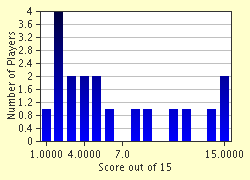Quiz Answer Key and Fun Facts
1. The earliest Bulgarian revolt against the Ottoman rule took place in the early 15th century. Who were its leaders?
2. Which European monarch met his death in the battle of Varna in 1444?
3. The following centuries saw numerous insurrections against Ottoman power in Bulgaria (including the First and Second Tarnovo Uprising, the clashes in Chiprovtsi and Macedonia and many others). All of these were brutally suppressed by the Ottoman forces. However, one of the events that played major role for Bulgaria's liberation was the analysis of Bulgarian history made by the monk Paisius of Hilendar. It kept the Bulgarian spirit alive during those dark times of the country's history and was one of the major inspirations for both Bulgarian revolutionary leaders and common people. So, in which year did "History of the Slav-Bulgarians" appear?
4. Which Bulgarian novelist is the author of "Under the Yoke"?
5. This man created the first modern Bulgarian primer.
6. Who were the kircaali?
7. Which Bulgarian freedom fighter wrote the so-called "Bloody Letter"?
8. The April Uprising took place in what year?
9. When did the St. Nedelya Church terrorist attack take place?
10. This Bulgarian poet became a casualty of World War I.
11. When did King Boris III come to power?
12. When did Bulgaria join the European Union?
13. As of August 2014, which Bulgarian politician serves as Director-General of UNESCO?
14. Which Bulgarian statesman was chosen as leader of the Party of European Socialists in 2011?
15. On which date is the Liberation Day of Bulgaria (from Ottoman rule) celebrated?
Source: Author
blackandgreen
This quiz was reviewed by FunTrivia editor
bloomsby before going online.
Any errors found in FunTrivia content are routinely corrected through our feedback system.


